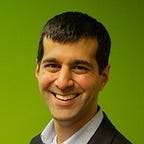Where Ancient Wisdom Meets Modern Science
Life lessons from neuroscience, Chinese philosophy, and atomic habits.
In some recent reading, I came across an unlikely common thread weaved through modern self-help book Atomic Habits, behavioral psychology and neuroscience book Behave, and ancient Chinese philosophy book The Path.
Self-Help and Atomic Habits
Atomic Habits shares best practices on developing and maintaining good habits and eliminating bad ones as an important approach to living our best lives. The author states that you can incrementally, atomically, bit-by-bit become the person you want to be through habits. By starting small, putting in the work daily, and being consistent, you will and can see revolutionary changes in your physical health, ability to learn a new skill, or even the quality of your relationships. The book does a nice job supporting the premise and much of the book is a practical set of guides to help you learn exactly what to do and how to do to build and develop those habits.
Neuroscience of Behavior
As I shared in an earlier blog, “Behave: The Biology of Humans at Our Best and Worst” by Robert Sapolsky provides a detailed explanation of the underlying neuroscience and biochemistry of our behavior: what causes us to do what we do. One of the primary assertions is that many of our worst behaviors — racial bias for example — are driven from deep within our neuroscience and rooted in evolution themselves. These behavior can be overcome through our cognitive functions of our prefrontal cortex (PFC)— rationally acknowledging and thinking about them. This of course, assumes that we (and our PFC) are not otherwise tired, hungry, or metabolically deprived in someway that precludes us from doing the necessary hard work to overcome our internal behaviors. From various research, the author shows that the best way to overcome our less desirable internal behaviors is not by relying on our will power each time but actually through early and often habituation. Children, for example, that are habituated to understand certain good behaviors, need not rationalize and think about them so much, they came naturally. Sounds obvious when you say it that way, right?
Ancient Chinese Philosophy
“The Path: What Chinese Philosophers Can Teach Us About the Good Life” by Michael Puett provides a great recap of several of the important Chinese philosopher and their philosophies on “The Way” and how to lead a good life.
The primary message highlights the importance of day-to-day living, starting with Confucius but throughout Mencius, Loazi, Zhuangzi and Xunzi:
For Confucius, everything began with this question: How are you living your life on a daily basis?
The author summarizes that concept here:
Our emotional dispositions develop by looking outward, not inward. They are not cultivated when you retreat from the world to meditate or go on a vacation. They are formed, in practice, through the things you do in your everyday life: the ways you interact with others and the activities you pursue. In other words, we aren’t just who we are: we can actively make ourselves into better people all the time.
And similarly, the author contrasts the Chinese philosophy with the Western philosophy that places more value on planning and conscious thought:
It’s a very different vision from asking grand questions such as “Who am I?” and “How should I plan out my life?” Instead, we work constantly to alter things at a small, daily level, and if we’re successful, we can build tremendous communities around us in which people can flourish. And even then, we continue to work. Our work — of bettering oneself and others to produce a better world — is never over.
Similar to the work by Sapolsky on neuroscience, Puett describes the challenge of relying on the conscious thought as tending to close off our mind by providing rigid categories and distinctions. The act of being present through our habits and practices helps us interact with the world more naturally, and less constrained.
Xunzi believed that Confucius alone had understood the most important, most fundamental practice: that of ritual training to become a better person.
Conclusion
One of my favorite TED Talks is by Srikumar Rao on Plugging Into Your Hard Wired Happiness. Just as shown from the others above, Rao calls upon ancient wisdom and literature to state that rather than orienting and focusing on goals and attempting to derive our happiness and life satisfaction from achievement and acquisition of material possessions, we should align our happiness with what we do: our practices. He states eloquently that to lead a happy life: “you do not invest in the outcome, you invest in the process.”
The take-away from these various sources — ancient Chinese philosophy, neuroscience, and modern best practices of self-help — all come back to this very notion of investing in the process. You can (and should) have goals; it’s important to have a vision, drive and ambition as these help guide our efforts. But your focus should be on your directed daily activities, your process, and your habits — those are the things that will help you be happy, help you improve and progress, and help you live your best life.
